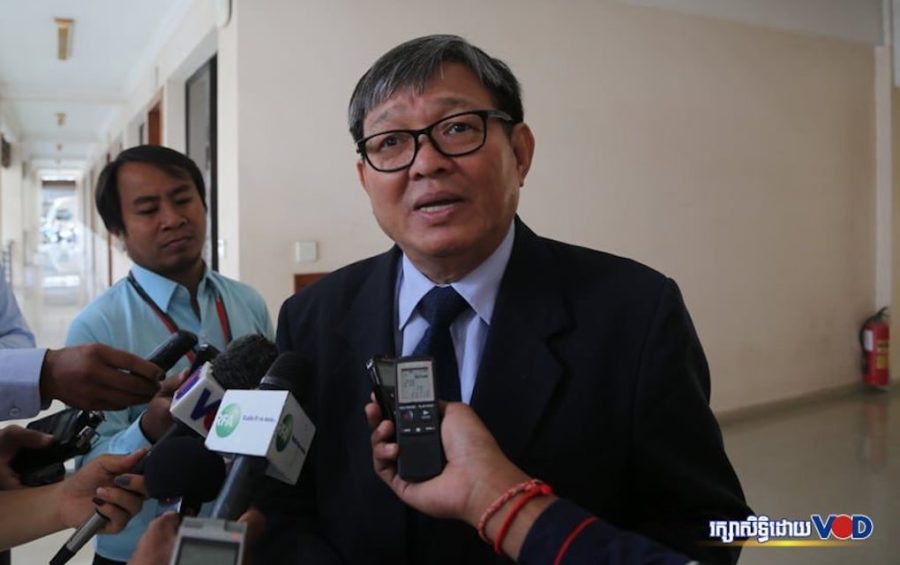In a 2014 interview with an Australian magazine, Son Chhay bemoaned that Cambodian politics had become “a personal game” between Prime Minister Hun Sen and then-CNRP president Sam Rainsy, criticizing his own boss.
“Hun Sen has lost his mind and Rainsy is just fooling around,” Chhay, a former CNRP lawmaker and Sam Rainsy Party whip, told The Monthly.
On Friday, he was again at odds with exiled leaders of the CNRP, when an official confirmed that Chhay had requested a government pardon so he could re-enter politics, breaking away from the outlawed main opposition party.
“Democrats should never leave fellow democrats to fight alone,” CNRP vice president Mu Sochua told VOD on Friday in a thinly veiled criticism.
But former colleagues and political analysts said on Monday that Chhay had always made a name for himself by marching to his own beat, bringing a willingness to challenge leaders, even those in his own party.
Political analyst Meas Nee said Chhay was known for being particularly active in the National Assembly, and “famous” for standing up and speaking out.
“During Assembly debates, Chhay always came to the forefront,” Nee said. “He was the one who dared to challenge [ruling CPP] Assembly members and politicians.”
In 1999, 2001, 2008 and again in 2015, Chhay questioned the late Cabinet Minister Sok An over corruption allegations.
In 2014, Chhay also campaigned against nepotism among National Assembly staff. Fourteen relatives of the Assembly secretariat’s deputy secretary-general were employed there, he claimed, and demanded a corruption investigation.
“But I have not had any public support from my party about this,” he complained to the Phnom Penh Post.
Sebastian Strangio, a journalist and the author of “Hun Sen’s Cambodia,” said Chhay was “one of the CNRP’s most able and detail-oriented parliamentarians.”
During conversations they had before 2016, however, Chhay seemed to already have misgivings about the CNRP’s focus on nationalist issues and its reliance on “the personalities of its two main leaders,” Strangio said.
The party, formed as a merger of the Sam Rainsy Party and Kem Sokha’s Human Rights Party, was dissolved in 2017 and 118 of its members were banned from politics for an election cycle. In late 2018, the government offered the chance for pardons to those banned politicians — a deal many saw as a way to whittle down the CNRP’s lingering clout.
Kong Korm, a reinstated former CNRP adviser, said Chhay was known for bridging the two poles of the party.
“He was in the middle of Mr. Kem Sokha and Mr. Sam Rainsy; he expressed his views and thought about what would benefit Cambodian and the country,” Korm said. “He stuck to his own freedom in expressing his views, and had good connections internally and outside the party and in the international community.”
Tep Sothy, another former CNRP parliamentarian who has received a pardon, said her recollections of Chhay included him trying to get other senior CNRP members to talk policy and long-term positions during meetings, “not the personal attacks of others.”
“It’s very difficult to try to change the minds of older politicians,” she said.
Chhay entered Cambodian politics in 1993, after surviving the Khmer Rouge and resettling in Australia. Elected to the National Assembly for the Buddhist Liberal Democratic Party — where CNRP co-founder Sokha also started — Chhay later joined the Sam Rainsy Party.
Ruling party spokesperson Sok Eysan said he welcomed Chhay’s decision to request his political rights be returned, calling him an “outstanding dignitary” and a “potential competitor” to the CPP in the future.
“Now he finds his own breath,” Eysan said. “We welcome and encourage him to do politics.”
Among the CNRP’s grassroots, however, Khoeun Virath, a former deputy commune chief in Phnom Penh’s Boeng Tompun, said he was disappointed that Chhay opted for “political rehabilitation.”
Local-level politicians had stayed in the country, withstood waves of intimidation from the government and remained loyal to the party, Virath said.
“They did not become scared from the intimidation and sell out,” he said. “They stuck with the CNRP and ate only grass,” doing whatever it took to survive, according to Virath.
“I regret that … [Chhay] betrayed the will of the people who voted for him and loved him,” the ex-commune chief said, adding that he was still sticking with the CNRP, and Rainsy and Sokha.
“As long as the two co-founders stay united with each other,” he said.












